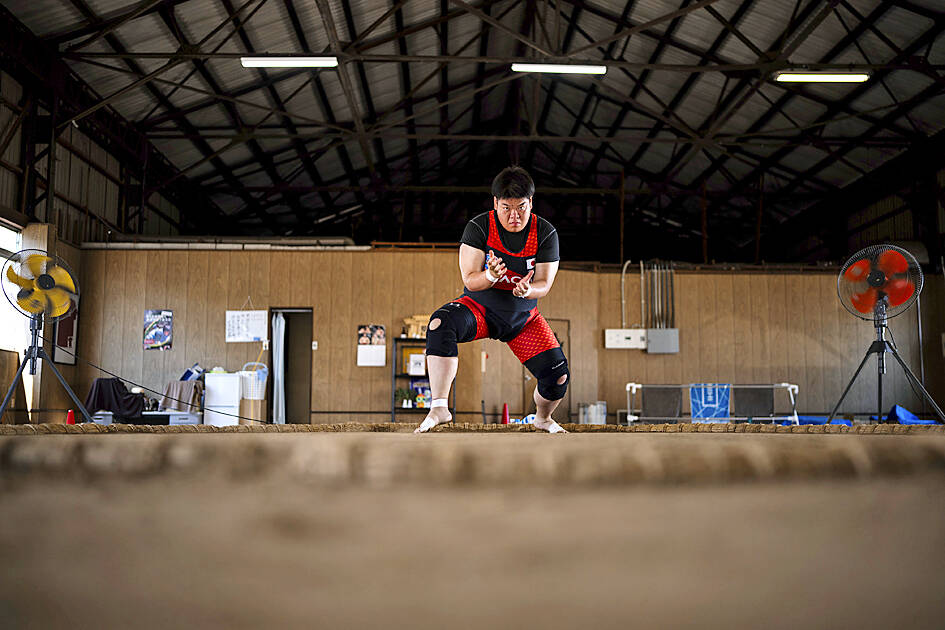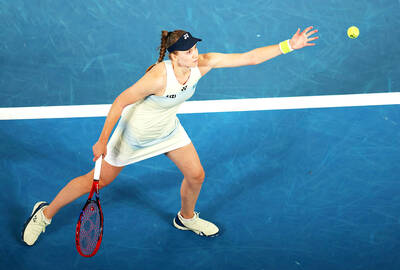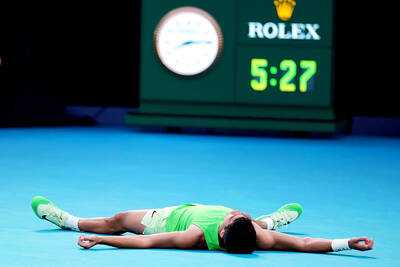Sumo is more than a sport in Japan. It is a sacred tradition, a 1,500-year-old spectacle steeped in Shinto ritual and ceremony. At its heart lies a long-standing taboo: women are still barred from the traditional ring, known as the dohyo in Japanese.
That legacy is now facing quiet resistance. While professional sumo — the sumo that the world is used to seeing — remains closed to women, a group of more than 600 female wrestlers is making strides at the amateur level in Japan. Their ambitions extend beyond the Sumo World Championships, an international men’s and women’s amateur sumo competition set to take place this weekend in Bangkok.
“I want sumo to become an Olympic sport with no gender distinction,” said 27-year-old Airi Hisano, who pursues sumo alongside her day-job at Tachihi Holdings and has a reputation as the strongest female sumo wrestler in Japan.

Photo: AP
She weighs 115kg and stands 1.72m tall. She is the sole member of the company’s women’s sumo club, but head coach Daiki Toyonoshima is pleased with his lone pupil, particularly when she is sparring with other females.
“Watching them throw each other and fall face-first without using their hands was deeply impressive,” said Toyonoshima, a former professional wrestler. “Women’s sumo is powerful and matches the intensity of male bouts.”
Veteran NHK broadcast commentator and club manager Fujio Kariya said that women’s sumo could have impact in a country where gender roles are rigid.
“It can spark real change — not just in sports, but across Japanese society,” Kariya said.
At another training site, the Keio University Sumo Club, women and men — and boys from the Keio High School team — train side by side.
Leading them is 22-year-old Rio Hasegawa, the middleweight world champion and the first female to join the Keio Club since its founding in 1919. At 1.71m and 72kg, she is taller and heavier than most Japanese women. Her build reflects the power sumo demands.
Unlike males who compete bare-chested in mawashi, the traditional loincloth, women wear it over spandex shirts and bodysuits.
“It’s unavoidable — women have body parts that must be covered,” Hasegawa said. “I’ve never wanted to compete dressed like a man.”
She added that clothing reflects cultural modesty while also signaling body image expectations.
“If I quit sumo, I might think about losing weight,” Hasegawa said.
Male sumo wrestlers often drop weight once they leave the sport, with research showing the large body mass might lead to health problems.
“In Japan, slim is often equated with beautiful, but for performance and health, thin isn’t everything,” said 19-year-old Shiho Suzuki, one of Keio’s four female wrestlers. “A strong, healthy body with some weight on it is attractive, too.”
Suzuki, who is 1.6m and 78kg, said that females in sumo often face teasing — enough to drive some to quit.
Others like Keio University sophomore Nana Nishida call it outright bullying.
As a junior high-school student, she lost 20kg over just three months in an attempt to make it stop.
“Sumo is a sport where you cannot win with technique alone,” Nishida said. “It’s important to make use of your body type.”
Since 2016, girls from across Japan have traveled to Tottori Johoku High School, about 600km west of Tokyo, to attend week-long spring and summer training camps at the nation’s largest girls’ sumo club.
Much about the camp is for getting stronger, improving technique and bulking up — which means not skimping on meals.
A typical meal consists of pork in a tangy sauce, vegetables, white rice and candied sweet potatoes. Also typical is the ritual weight check before and after eating.
“We eat to build muscle and maintain our weight,” said 15-year-old Sora Kusuda from Osaka, who has practiced sumo for seven years and weighs 110kg and stands 1.65m.
Japanese government data show that more than 20 percent of Japanese women in their 20s and 30s are underweight.
Sumo wrestlers are not trying to lose weight
In fact, Kusuda has another clear goal related to weight, practice and technique.
“I want to become a world champion,” she said.

Nottingham Forest FC are to go into the Europa League play-off round after a 4-0 win over Ferencvaros TC on Thursday, while Celtic FC secured their place in the knockout phase with a victory over FC Utrecht. Aston Villa FC finished second in the league phase after recovering from two goals down to beat FC Red Bull Salzburg 3-2 with their spot in the last 16 already assured. Forest stood an outside chance of climbing into the top eight going into the final round of matches, but needed to beat Robbie Keane’s Ferencvaros and rely on other results going their way. Sean Dyche’s

HEATED RIVALRY: The pair had met 14 times previously, with Sabalenka winning eight of the encounters and entering the final as the favorite to take the title Elena Rybakina took revenge over world No. 1 Aryna Sabalenka to win a nail-biting Australian Open final yesterday and clinch her second Grand Slam title. The big-serving Kazakh fifth seed held her nerve to pull through 6-4, 4-6, 6-4 at Rod Laver Arena in Melbourne in 2 hours, 18 minutes. It was payback after the Belarusian Sabalenka won the 2023 final between two of the hardest hitters in women’s tennis. The ice-cool Rybakina, 26, who was born in Moscow, adds her Melbourne triumph to her Wimbledon win in 2022. It was more disappointment in a major final for Sabalenka, who won the US Open

Denver superstar Nikola Jokic returned from a 16-game injury absence to post a 31-point, 12-rebound double-double on Friday and propel the Nuggets to a 122-109 NBA victory over the Los Angeles Clippers. Three-time NBA Most Valuable Player Jokic had not played since suffering a bone bruise in the left knee he hyperextended in a game against Miami on Dec. 29 last year. The Serbian big man did not miss a beat. He led all scorers, connecting on eight of 11 shots from the field, and also handed out five assists with three steals while playing just 24 minutes, 32 seconds as the

BATTERED AND BRUISED: Alcaraz suffered a cramp in the third set, but was allowed treatment despite Zverev’s protests, and continued on to win in five-and-a-half hours An ailing Carlos Alcaraz battled past Alexander Zverev yesterday in five epic sets to reach his first Australian Open final and move within a match of becoming the youngest man to complete a career Grand Slam. The world No. 1 outlasted the German third seed 6-4, 7-6 (7/5), 6-7 (3/7), 6-7 (4/7), 7-5 over a titanic 5 hours, 27 minutes in hot conditions to head to tomorrow’s title match. He only narrowly avoided crashing out after a huge fright at 4-4 in the third set when he pulled up in pain with what appeared to be cramp. He was allowed to have treatment